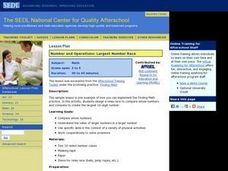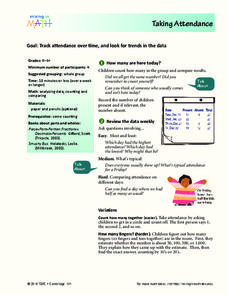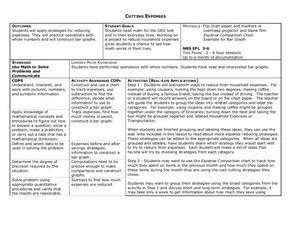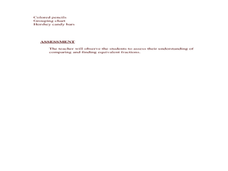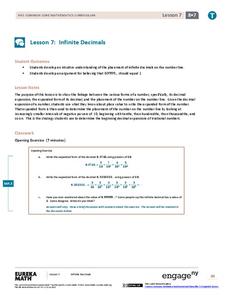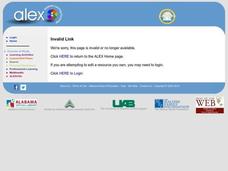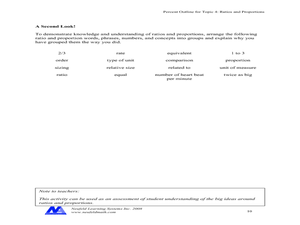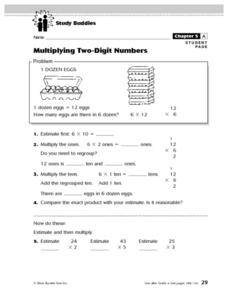Curated OER
Mystery Number
Learners explore numbers 1-100. In this cross curriculum literacy and numeration lesson, students listen to the book More or Less by Stuart J. Murphy. Learners play a game with a partner in which they guess the "mystery number" based on...
Curated OER
Linear Inequalities
Students solve linear inequalities. In this solving linear inequalities lesson, students solve one step inequalities algebraically. Students graph the solutions on a number line. Students compare the graphs of various inequalities such...
Curated OER
Comparing and Ordering Fractions
Students compare and organize different fractions. In this fraction instructional activity, students use wax paper divided into squares to represent fractions. Students put them in different orders based on their value to complete...
Curated OER
Jelly Bean Math
Students estimate, measure, compute, and create patterns using jelly beans. In small groups, they solve various calculations, place jelly beans into groups, invent a new flavor, create a pattern, and complete a worksheet.
Curated OER
Unit Rates
Students calculate unit rates with fractions and whole numbers. For this algebra lesson, students compare numbers, perform long division, and calculate the rate of different units through conversions. They model some of the problems as...
Curated OER
Number and Operations- Largest Number Race
Students participate in a race to compare whole numbers. In this number operations lesson, students create the largest 10-digit number and discuss how they constructed the largest number.
Curated OER
Number and Number Relations: Lesson 2
Fourth graders participate in using the terminology of more, less, between, compare, and order. They compare whole numbers and use the symbols for <, >, =. They order whole numbers and practice with problems where they use this...
Curated OER
Number and Number Relations: Lesson 3
Eighth graders compare whole numbers and decimals. They use symbols for <, >, =, and order whole numbers and decimals. They practice the meaning of positive and nugative integers by using them to describe real-world situations.
Curated OER
Taking Attendance
Young mathematicians record and analyze data. They will take attendance for their class and compare to other days. Then discuss ways to count who is present. They may also show the amount of learners present using fractions.
Curated OER
The History of Mathematics
Research the interrelationship between math and science. Search the Internet to discover the history of several branches of mathematics and make text-to-world connections between the concepts covered in each branch with related...
Curated OER
Equivalent Fraction Paper Strips
Young learners compare the relative values of fractions by making physical representations. They fold and label strips of paper that are equal in length to represent "one whole" and the equal parts that fractions represent. Also, they...
Curated OER
An Apple a Day
Students sort and compare apples before making apple prints. In this apple lesson, students use a painting to inspire art prints made with apple halves. Students compare and sort apples.
Curated OER
Cutting Expenses
Students explore budgeting. In this finance and math lesson plan, students brainstorm ways in which households could save money. Students view websites that give cost reducing ideas. Students complete an expense comparison chart and use...
Curated OER
Hershey Bar Equivalent Fractions
Fourth and fifth graders explain how to use equivalent fractions. They recognize which fractions are equivalent. Pupils find equivalent fractions.
EngageNY
Decimal Expansions of Fractions, Part 2
Develop your pupils' understanding of fractions and their decimal equivalence using the 12th instructional activity in this series. Scholars learn an alternative to long division that results in converting fractions to decimals that...
EngageNY
Infinite Decimals
Can you support the argument that the decimal 0.99999 ... is equivalent to the number one? The seventh installment in this 25-part module gives convincing support for this conclusion. Pupils write infinite decimals using powers of 10....
Alabama Learning Exchange
Understanding Fractions
Young learners explore fractions and demonstrate parts of a whole by using a candy bar and a piece of paper and dividing both into equal parts. Included is a worksheet that requires youngsters to color in half of each polygon shape. Some...
Curated OER
Making Simple Conversions
Young scholars explore the concept of measurement as it relates to equivalencies. They complete simple conversions using visual models of measurement units, and record their answers in a two-column table.
Curated OER
Division by Fractions (Part Two)
Investigate division through the use of array models. The lesson focuses on using area models to compare division as sharing with division as grouping. Students evaluate the usefulness and limitations of the two array models.
Curated OER
How Many?
Establish 1:1 correspondence by counting students, first one gender, then the other. Give each child a colored cube (one color for boys, another for girls) and have small groups determine more or less and how many all together. As a...
Neufeld Learning Systems
Concept: Ratios and Proportions
Upper elementary and middle school pupils fill out a chart creating six equivalent fractions and then compare them to six different objects and/or shapes. They group together 16 various terms related to ratios and proportions. Pupils...
National Security Agency
Ordering, Adding and Subtracting Integers
Prealgebrarians use colored chips, stickers, and pencils to explore the world of integers. They discover absolute value, compare positive and negative integers, and apply operations to them. A detailed procedure for the three-part lesson...
Curated OER
Study Buddies: Multiplying Two-Digit Numbers
In this math homework worksheet, students will solve a 2 digit multiplication problem with parental support. Students will follow a step-by-step process and "Coach's Notes" are provided for the parent helper.
Alabama Learning Exchange
The World of Integers
Review operations related to rational numbers and integers using the include PowerPoint presentation, "Interesting Integers." Young mathematicians classify rational numbers as being natural, whole, or integers and read an article about...







